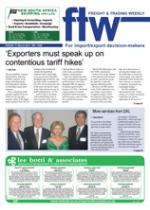Trade discounts are given by
sellers from time to time – all
of them being to secure a sale,
while the buyer is looking for
a bargain. Such discounts may
be offered to attract business,
they may be volume related,
or due to circumstances such
as end-of-line or season stock
or cancelled orders being sold
at a reduced price.
While discounts will
be attractive to any buyer,
importers need to be aware
that such a discount may or
may not be allowed when the
value of the goods is declared
to Customs when making due
entry of the goods.
Discounts can give rise to
difficulties when declaring
the correct customs value.
Section 66 of the Customs
& Excise Act provides that
the transaction value (the
value to be declared) of any
imported goods shall be the
price actually payable for the
goods then sold for export to
the Republic.
Logically you would think
this would be the discounted
price actually paid to the
seller in the country of export.
The Customs Valuation
Guide, however, stipulates
that discounts given for the
following reasons are dutiable:
“buyer • undertakes certain
activities for or on behalf
of the seller as part of the
payment under the contract
of sale;
• the buyer provides other
goods/services to a third
party for or on behalf of the
seller as a condition of sale
of the imported goods.
• a party’s relationship affects
the price;
• the price of the imported
goods has received credits
made in respect of earlier
transactions.”
Customs has the right
to question any charge or
deduction reflected on your
supplier’s invoice. As such,
they are well within their
rights to request proof of
the nature of any discounts
to ascertain whether such
deduction is allowable.
If, for example, the discount
is a trade discount allowed
by your supplier to all other
importers, in the ordinary
course of trade under fully
competitive conditions, it
is not dutiable. If Customs
requests proof of the discount,
it should be no problem to
provide the necessary proof
i.e. a copy of the supplier’s
price list reflecting the
discount.
The Agreement on
Implementation of Article
VII of the Geneva Agreement
on Tariffs and Trade (“the
Valuation Agreement”),
to which South Africa is a
signatory, states that “fully
competitive conditions permit
a contracting party to exclude
from consideration prices
involving special discounts
limited to exclusive agents”.
This is incorporated into our
law by section 74A of the
Customs Act.
Customs can therefore
include a discount in the
dutiable value, if it is found
that the discount was only
allowed to that importer and
not other importers buying the
same product, under the same
conditions from the same
exporter.
When carrying out
valuation on imports,
Customs is concerned with
the “price actually paid or
payable” which is defined in
the Act as “the total payment
made or to be made, either
directly or indirectly, by the
buyer to or for the benefit of
the seller for the goods, but
does not include dividends
or other payments passing
from the buyer to the seller
which do not directly relate
to the goods”. In other words,
Customs is concerned with
the price relating to the
goods being imported. A
retrospective discount is a
discount which relates to
a previous shipment. As it
does not relate to the current
shipment, it is dutiable and
the amount should not be
deducted from the price
actually paid or payable when
declaring the customs value.
Importers must therefore
ensure that their clearing and
forwarding agents are fully
aware of the circumstances in
which a discount was obtained
in order to ascertain whether
such a discount will be
accepted when determining
the transaction value or value
to be declared for customs
purposes.
The consequences of failing
to do so can be serious, and
given the indication in the
Budget Speech that there will
be additional emphasis on
compliance, importers would
do well to show caution.
Be aware of the Customs implications of trade discounts
11 Mar 2011 - by Staff reporter
0 Comments
FTW - 11 Mar 11

11 Mar 2011
11 Mar 2011
11 Mar 2011
11 Mar 2011
11 Mar 2011
Border Beat
Featured Jobs
New
New
